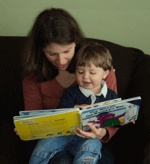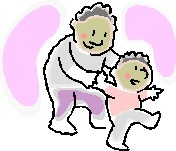Helpful strategies

As your child's first teacher, you may be feeling a sense of loss of control when your child goes off to school. While you can't control what is going on in the classroom, you can and should still have a huge impact on your child's education. In fact, the one-on-one time you provide your child will be a key factor in his or her success.
Below you will see snippets of the reading and writing process. In the Newsletter section you will find more information, tips, and activities to try with your child.
READING
Why are high-frequency "irregular" words still important?
High-frequency "irregular" words are words that are not easy to read using decoding alone since the spelling does not always match the way they are read (ex. the word “was” sounds more like “wuzz”). In any given text that your child will read, the high-frequency words will likely make up 1/3 to 1/2 of the text. If your child has trouble reading them, his/her reading rate and comprehension will be slowed down. However, when your child can recognize and read these words efficiently, he/she can master more authentic stories sooner.
WRITING
Visualize this common scene:
A ten month old baby is learning to walk, while holding onto her father’s hands and having her legs guided by a gentle nudge of her Dad’s feet.

As a witness to this, one generally praises the baby for her efforts, perhaps even claps while saying, “You’re walking!” We don’t dwell on that scene negatively and think, “Well, she’s not really walking; she isn’t even bending her knees.” Even though this child is not actually walking by herself, she is on the path to becoming a walker.
This stage is part of a process, which usually also includes crawling. Some children may crawl backward before moving forward and others never crawl at all. Some children seem to crawl for a long time before getting up on their feet, yet we know that unless there is a severe medical issue, a child will not crawl forever.
How Does This Relate to Writing?
Think of your child’s attempts to write. Every attempt is a great accomplishment and a good start on the journey to becoming a writer. Children need to have their efforts acknowledged so they can feel like readers and writers. With beginning writers, as with a child learning to walk or talk, we do not focus all of our attention on their faults or
mistakes. Instead, we see what they can do and encourage their efforts while guiding them along the writing path.
 Children are made readers on the laps of their parents.
Children are made readers on the laps of their parents. 
-Emilie Buchwald
Click  here to view short videos for tips that will promote your child's beginning reading and writing skills.
here to view short videos for tips that will promote your child's beginning reading and writing skills.